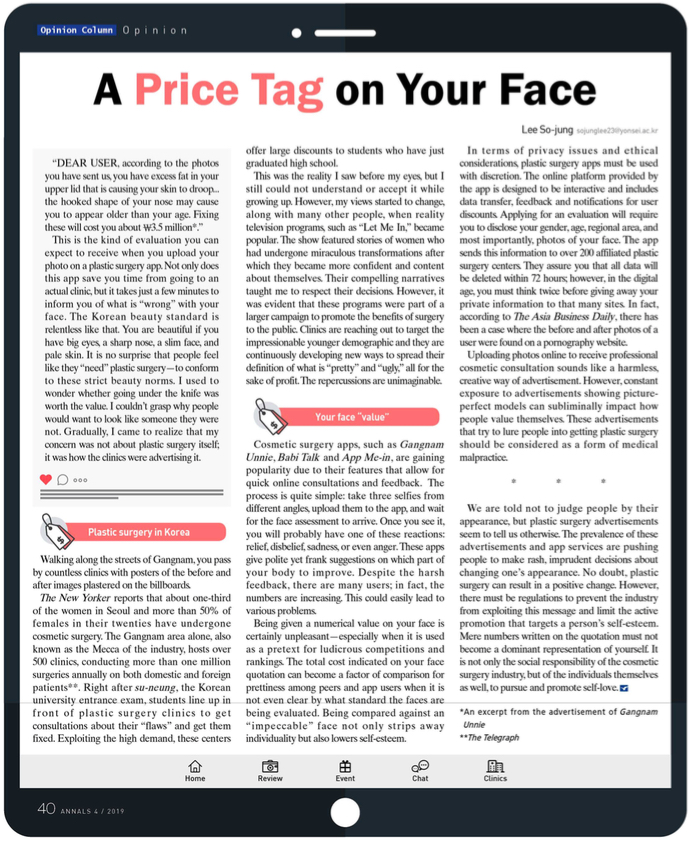
“DEAR USER, according to the photos you have sent us, you have excess fat in your upper lid that is causing your skin to droop... the hooked shape of your nose may cause you to appear older than your age. Fixing these will cost you about ₩3.5 million*.”
This is the kind of evaluation you can expect to receive when you upload your photo on a plastic surgery app. Not only does this app save you time from going to an actual clinic, but it takes just a few minutes to inform you of what is “wrong” with your face. The Korean beauty standard is relentless like that. You are beautiful if you have big eyes, a sharp nose, a slim face, and pale skin. It is no surprise that people feel like they “need” plastic surgery—to conform to these strict beauty norms. I used to wonder whether going under the knife was worth the value. I couldn’t grasp why people would want to look like someone they were not. Gradually, I came to realize that my concern was not about plastic surgery itself; it was how the clinics were advertising it.
Plastic surgery in Korea
Walking along the streets of Gangnam, you pass by countless clinics with posters of the before and after images plastered on the billboards.
The New Yorker reports that about one-third of the women in Seoul and more than 50% of females in their twenties have undergone cosmetic surgery. The Gangnam area alone, also known as the Mecca of the industry, hosts over 500 clinics, conducting more than one million surgeries annually on both domestic and foreign patients**. Right after su-neung, the Korean university entrance exam, students line up in front of plastic surgery clinics to get consultations about their “flaws” and get them fixed. Exploiting the high demand, these centers offer large discounts to students who have just graduated high school.
This was the reality I saw before my eyes, but I still could not understand or accept it while growing up. However, my views started to change, along with many other people, when reality television programs, such as “Let Me In,” became popular. The show featured stories of women who had undergone miraculous transformations after which they became more confident and content about themselves. Their compelling narratives taught me to respect their decisions. However, it was evident that these programs were part of a larger campaign to promote the benefits of surgery to the public. Clinics are reaching out to target the impressionable younger demographic and they are continuously developing new ways to spread their definition of what is “pretty” and “ugly,” all for the sake of profit. The repercussions are unimaginable.
Your face “value”
Cosmetic surgery apps, such as Gangnam Unnie, Babi Talk and App Me-in, are gaining popularity due to their features that allow for quick online consultations and feedback. The process is quite simple: take three selfies from different angles, upload them to the app, and wait for the face assessment to arrive. Once you see it, you will probably have one of these reactions: relief, disbelief, sadness, or even anger. These apps give polite yet frank suggestions on which part of your body to improve. Despite the harsh feedback, there are many users; in fact, the numbers are increasing. This could easily lead to various problems.
Being given a numerical value on your face is certainly unpleasant—especially when it is used as a pretext for ludicrous competitions and rankings. The total cost indicated on your face quotation can become a factor of comparison for prettiness among peers and app users when it is not even clear by what standard the faces are being evaluated. Being compared against an “impeccable” face not only strips away individuality but also lowers self-esteem.
In terms of privacy issues and ethical considerations, plastic surgery apps must be used with discretion. The online platform provided by the app is designed to be interactive and includes data transfer, feedback and notifications for user discounts. Applying for an evaluation will require you to disclose your gender, age, regional area, and most importantly, photos of your face. The app sends this information to over 200 affiliated plastic surgery centers. They assure you that all data will be deleted within 72 hours; however, in the digital age, you must think twice before giving away your private information to that many sites. In fact, according to The Asia Business Daily, there has been a case where the before and after photos of a user were found on a pornography website.
Uploading photos online to receive professional cosmetic consultation sounds like a harmless, creative way of advertisement. However, constant exposure to advertisements showing picture-perfect models can subliminally impact how people value themselves. These advertisements that try to lure people into getting plastic surgery should be considered as a form of medical malpractice.
* * *
We are told not to judge people by their appearance, but plastic surgery advertisements seem to tell us otherwise. The prevalence of these advertisements and app services are pushing people to make rash, imprudent decisions about changing one’s appearance. No doubt, plastic surgery can result in a positive change. However, there must be regulations to prevent the industry from exploiting this message and limit the active promotion that targets a person’s self-esteem. Mere numbers written on the quotation must not become a dominant representation of yourself. It is not only the social responsibility of the cosmetic surgery industry, but of the individuals themselves as well, to pursue and promote self-love.
*An excerpt from the advertisement of Gangnam Unnie
**The Telegraph
Lee So-jung
sojunglee23@yonsei.ac.kr

